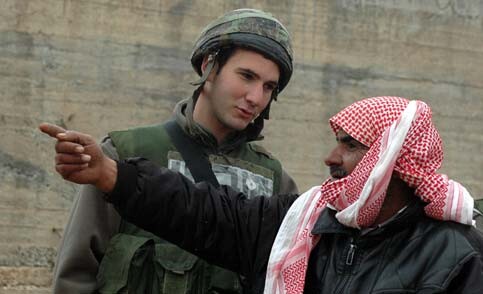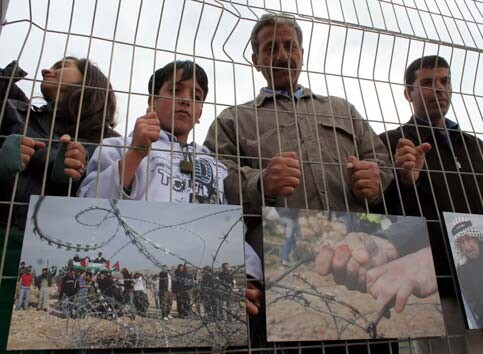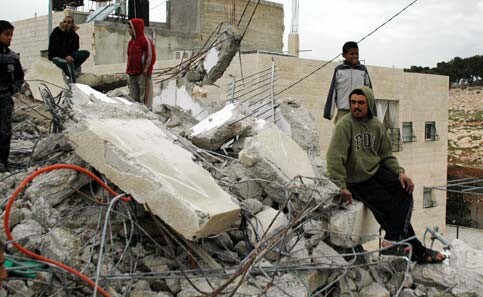Palestinian Center for Human Rights 1 February 2007

Palestinian argues with Israeli soldier during demolishing houses in Alezaryieh village near Jerusalem January 30, 2007. (MaanImages/Fadi Tanas)
Israeli Occupation Forces (IOF) Continue Systematic Attacks on Palestinian Civilians and Property in the Occupied Palestinian Territory (OPT)
Summary
Israeli violations of international law and humanitarian law continued in the OPT during the reporting period (18 - 24 January 2007):
Killing: During the reporting period, IOF killed a Palestinian child in the northern West Bank town of Tulkarm. They fired one bullet at him when he attempted to escape. They left him bleeding to death. The victim was not armed. According to the child’s family, the child attempted to escape as IOF had repeatedly raided his family home searching for him.
During the reporting period, 9 Palestinian civilians and a British journalist were wounded by IOF.
On 26 January 2007, two Palestinian civilians and a British journalist were wounded when IOF used force against a peaceful demonstration organized in Bal’ein village in protest to the construction of the Annexation Wall. On 30 January 2007, 3 Palestinian civilians were wounded when IOF opened fire at a taxi near Jenin. On 31 January 2007, a woman and a child were wounded by IOF in Nablus.
In the Gaza Strip, two Palestinian civilians were wounded on 28 January 2007, when IOF positioned at the border between the Gaza Strip and Israel fired at them. The two civilians were hunting birds nearly 500 meters away from the border.
Incursions: During the reporting period, IOF conducted at least 18 military incursions into Palestinian communities in the West Bank. During these incursions, IOF raided houses and arrested 84 Palestinian civilians, including 6 children and 4 women. Thus, the number of Palestinians arrested by IOF in the West Bank since the beginning of this year has mounted to 321. IOF also destroyed a house in Nablus, claming that one of its residents is wanted.

Palestinians attend a photographic exhibition against military barriers at Huwarra checkpoint south of the West Bank city of Nablus, February 3, 2007. (MaanImages/Rami Swidan)
Restrictions on Movement: IOF have continued to impose a tightened siege on the OPT and imposed severe restrictions on the movement of Palestinian civilians in the Gaza Strip and the West Bank, including occupied East Jerusalem.
Gaza Strip
IOF have imposed a strict siege on the Gaza Strip. They have closed its border crossings as a form of collective punishment against Palestinian civilians.
IOF have closed Rafah International Crossing Point since 25 June 2006, even though they do not directly control it. IOF have partially reopened commercial crossings, especially al-Mentar (Karni) crossing, but many goods and medical supplies have been lacked in markets in the Gaza Strip. IOF have also continued to close Erez crossing in the northern Gaza Strip. Hundreds of thousands of Palestinians from the Gaza Strip have been prevented from traveling through this crossing. IOF have allowed international workers to pass through the crossing. With this closure, only few Palestinian patients have been able to travel to hospitals in Israel and the West Bank. In addition, IOF have continued to prevent Palestinian fishermen from fishing for nearly 8 months.

Palestinians inspect the demolished houses after Israeli soldiers demolished them in Alezaryieh village near Jerusalem January 30, 2007. (MaanImages/Fadi Tanas)
West Bank
IOF have tightened the siege imposed on Palestinian communities in the West Bank. They have isolated Jerusalem from the rest of the West Bank. Contrary to Israeli claims, IOF positioned at various checkpoints in the West Bank have continued to impose severe restrictions on the movement of Palestinian civilians. During the reporting period, IOF soldiers positioned at various checkpoints in the West Bank arrested 7 Palestinian civilians, including two children.
The outcome of crimes committed by IOF since 25 June 2006:
Israeli Violations Documented during the Reporting Period (25 - 31 January 2007)
1. Incursions into Palestinian Areas and Attacks on Palestinian Civilians and Property in the West Bank and the Gaza Strip
Thursday, 25 January 2007
1. ‘Ali Mahmoud ‘Aqel, 43. member of the municipal council;
2. Maher ‘Abdul Muhsen al-Atrash, 35, a staff member of the municipality; and
3. Rafe’ Rasmi Madiya, 27.
1. Bilal al-Masa’id, 27; and
2. Ramzi Jouda al-Masa’id, 31.
1. Taghreed Ibrahim al-Swaiti, 25, the wife of Mahmoud Isma’il al-Swaiti, a mother of a child; and
2. Muntaha ‘Eissa al-Swaiti, 27, the wide of Mousa Mohammed al-Swaiti, a mother of two children.
“At approximately 10:30 on Thursday, 25 January 2007, I was together with my two brothers in our house in al-Malsat area in the north of Tulkarm. I was in the kitchen when one of my brothers came and told me that IOF soldiers were at the door of our house. I went to close the door of the kitchen. I saw Fadel Mutlaq Balawna, one of our neighbors jumping from my uncle’s house into our house yard. He was scared. I went to the western side of the house. I looked through the window and I saw Balawna again. I said to him: ‘There are soldiers in the street and around the house, so do not move.’ He replied: ‘I am like a brother for you, so open the door for me.’ I was afraid that they could shoot him while entering the house, so I told him to stray where he was. I gave him a cloak and a scarf to wear them and he did. I saw a soldier looking through a hole in the fence. He ordered Balawna to stop. Balawna took off the cloak and the scarf and attempted to climb the fence. An IOF soldier positioned to the north of the house fired at Balawna. He was wounded by a gunshot to the back, while he was jumping out of the house yard. He fell onto the ground two meters away from the fence. I looked at him through the window of the bedroom in the south of the house and talked to him. I asked him to moved his hand if he was still a live and he did. I bring water and poured it onto his face. I phoned my father to bring an ambulance, but IOF soldiers did not allow the ambulance to attend Balawna. He was left bleeding for nearly 45 minutes. IOF soldiers them moved towards him, and one of them pulled him brutally from his feet. Balwana was not armed and I did not heard any exchange of fire. I heard the sound of one bullet only, which hit Balawna.”
Friday, 26 January 2007
1. Hamza Khalil Abu Namous, 25, from ‘Ein Beit al-Maa’ refugee camp; and
2. Jamal Jalal Tayeh, 27, from Iraq al-Tayeh village east of Nablus.
1. Mahmoud Mohammed al-Hroub, 28;
2. Khader Khalil al-Hroub, 35;
3. Faisal Isma’il al-Hroub, 27;
4. ‘Abdullah Mahmoud al-Hroub, 22;
5. Mahmoud Ahmed al-Hroub, 24;
6. Daoud ‘Abdul Wahab al-Hroub, 19;
7. Mahmoud Isma’il al-Hroub, 22;
8. ‘Abdullah ‘Abdul Hamid al-Hroub, 30;
9. Mohammed Ahmed al-Hroub, 19;
10. Tha’er Hasan al-Hroub, 25;
11. Ahmed Mohammed Salah, 22; and
12. Dib Mohammed Salah, 26.
Saturday, 27 January 2007
1. Mohammed As’ad Abu Namous, 16;
2. Ahmed Yousef Abu al-Reesh, 21;
3. Shadi Shihada Abu al-Reeesh, 16.
Sunday, 28 January 2007
1. Adham Tawfiq Tamboura, 21, from Beit Lahia, wounded by a bullet to the feet; and
2. Mohammed Lutfi al-Kafarna, 21, from Beit Hanoun, wounded by a bullet to the left foot.
Monday, 29 January 2007
1. ‘Abdul Karim Khalil ‘Owais, 23, an officer of the Palestinian National Security Forces;
2. ‘Alaa’ ‘Abdul Fattah Abu Hamed, 24;
3. Ma’ath Ibrahim Zahran, 25;
4. Shadi Isma’il Hardan, 25;
5. ‘Ali Mohammed Hasanain, 27;
6. Mazen Mohammed Hasanain, 24;
7. Mohammed Akram Ja’idi, 21;
8. Akram Jamal Abu Saleh, 26;
9. Shihab Jamal Abu Saleh, 23;
10. Yazan Mohammed Abu Shihab, 22; and
11. Rzeeq Mohammed Abu Shihab, 25.
Tuesday, 30 January 2007
1. ‘Ammar Ghazi ‘Aamer, 32;
2. ‘Adeek Ghazi ‘Aamer, 28;
3. Marwan Naji Mansour, 22;
4. Ahmed Naji Mansour, 24;
5. Sa’ad Ibrahim ‘Aamer, 34;
6. Adham ‘Ata ‘Aamer, 22;
7. Bilal Fathi Rasheed, 20;
8. Jalal, Fathi Rasheed, 22;
9. Shawkat Fathi Rasheed, 24;
10. Eyad Fathi Rasheed, 25;
11. ‘Ammar Zaidan Rasheed, 20;
12. Bahjat Zaidan Rasheed, 26;
13. Tha’er Bassem Mansour, 28;
14. Bassem Bassem Mansour, 23;
15. Tamer Bassem Mansour, 26;
16. Saher Bassem Mansour, 24;
17. Yasser ‘Antar, 28;
18. ‘Alaa’ ‘Antar, 25;
19. Firas ‘Omar Mansour, 21;
20. Shadi ‘Abdul Basset Mansour, 23;
21. Fadi ‘Abdul Basset Mansour, 21; and
22. Nasser Jamal Abu al-S’oud, 38.
1. Nour al-Din ‘Adnan al-Ja’bari, 27, wounded by a bullet to the foot;
2. Silah ‘Adnan al-Ja’bari, 13, wounded by a bullet to the buttock; and
3. ‘Abdullah Ahmed Nawahda, 40, the driver, wounded by a bullet to the chest.
IOF arrested the four persons and took him to a hospital inside Israel.
Wednesday, 31 January 2007
1. Khaled Ziad al-Masri, 25;
2. Khaled Jamal al-Beshtawi, 24;
3. Ibrahim Mahmoud al-Siksik, 22;
4. Mohammed ‘Abdullah al-Sheikh Khalil, 24;
5. Eihab Khaled al-Swaifi, 17; and
6. Mo’ayad Khaled al-Swaifi, 21.
2. Continued Siege on the OPT
IOF have continued to impose a tightened siege on the OPT and imposed severe restrictions on the movement of Palestinian civilians in the Gaza Strip and the West Bank, including Occupied East Jerusalem.
Gaza Strip
IOF have continued to close all border crossings of the Gaza Strip. During the reporting period, these crossings were partially reopened to allow the entry of basic foodstuffs, medical supplies and other necessities into the Gaza Strip. The total siege imposed by IOF on the Gaza Strip has left disastrous impacts on the humanitarian situation and has violated the economic and social rights of the Palestinian civilian population, particularly the rights to appropriate living conditions, health and education. It has also paralyzed most economic sectors. Furthermore, severe restrictions have been imposed on the movement of the Palestinian civilian population.
The closure of border crossings deprives the Palestinian civilian population in the Gaza Strip of their right to freedom of movement, education and health.
IOF have continued to impose severe restrictions on fishing in the Gaza Strip. Following the attack on IOF on 25 June 2006, IOF prevented fishing. Approximately 35,000 people in and around Gaza’s coastal communities rely on the fishing industry, including 2,500 fishermen, 2,500 support staff and their families. Fishermen have been subjected to intensive monitoring by IOF, which use helicopter gunships and gunboats to monitor the fishermen. The Oslo Accords allow Palestinian fishermen to go fishing up to 20 nautical miles away from the Gaza seashore.
The West Bank
IOF have imposed a tightened siege on the West Bank. They have continued to impose severe restrictions on the movement of Palestinian civilians and imposed curfews on a number of Palestinian communities.
At approximately 15:00 on Friday, 26 January 2007, IOF soldiers positioned at Ras al-Wad checkpoint, southeast of Bethlehem, arrested Shiekh Suleiman Thwaib, 48, the Imam of a mosque in Za’tara village east of the town.
On Monday noon, 29 January 2007, IOF soldiers positioned at Hawara checkpoint, south of Nablus, arrested two Palestinian children.
On Saturday morning, 27 January 2007, IOF soldiers positioned at Wad al-Teen checkpoint, south of Tulkarm, arrested Fadi Mohammed Shamasna, 21, from Jayous village north of Qalqilya.
At approximately 15:00 on Thursday, 25 January 2007, IOF soldiers positioned at a checkpoint at al-Kfair intersection, southeast of Jenin, arrested Ahmed ‘Abdul Qader Qassem, 20, from al-Far’a refugee camp southeast of the town.
3. Construction of the Annexation Wall
IOF have continued to construct the Annexation Wall inside West Bank territory. During the reporting period, IOF used force against a peaceful demonstration organized by Palestinian civilian in protest to the construction of the Wall in Bal’ein village, west of Ramallah.
1. Jason, 30, a British journalist, hit by a sound bomb to the head;
2. Muheeb al-Barghouthi, 42, hit by a sound bomb to the head; and
3. Majdi ‘Abdul Mo’men Abu Rahma, 16, hit by a tear gas canister to the back.
Recommendations to the International Community
1. PCHR calls upon the High Contracting Parties to the Fourth Geneva Convention to fulfill their legal and moral obligations under Article 1 of the Convention to ensure Israel’s respect for the Convention in the Occupied Palestinian Territory. PCHR believes that the conspiracy of silence practiced by the international community has encouraged Israel to act as if it is above the law and encourages Israel continue to violate international human rights and humanitarian law.
2. PCHR calls upon the High Contracting Parties to the Fourth Geneva Convention to convene a conference to take effective steps to ensure Israel’s respect of the Convention in the OPT and to provide immediate protection for Palestinian civilians.
3. PCHR calls upon the High Contracting Parties to the Fourth Geneva Convention to comply with its legal obligations detailed in Article 146 of the Convention to search for and prosecute those responsible for grave breaches, namely war crimes.
4. PCHR recommends international civil society organizations, including human rights organizations, bar associations and NGOs to participate in the process of exposing those accused of grave breaches of international law and to urge their governments to bring these people to justice.
5. PCHR calls upon the European Union to activate Article 2 of the Euro-Israel Association Agreement, which provides that Israel must respect human rights as a precondition for economic cooperation between the EU states and Israel. PCHR further calls upon the EU states to prohibit import of goods produced in illegal Israeli settlements in the OPT.
6. PCHR calls upon the member States of the EU, and all other states, to adopt a voting pattern at the UN bodies, particularly the General Assembly, Security Council and Commission on Human Rights which is keeping with international law.
7. PCHR demands that the International Court of Justice Advisory Opinion be immediately implemented by the international community.
8. PCHR calls on the international community to recognize the Gaza disengagement plan, which was implemented last year, for what it is - not an end to occupation but a compounding of the occupation and the humanitarian crisis in the Gaza Strip.
9. In recognition of ICRC as the guardian of the Fourth Geneva Convention, PCHR calls upon the ICRC to increase its staff and activities in the OPT, including the facilitation of family visitations to Palestinian prisoners in Israeli jails.
10. PCHR appreciates the efforts of international civil society, including human rights organizations, bar associations, unions and NGOs, and urges them to continue their role in pressuring their governments to secure Israel’s respect for human rights in the OPT and to end its attacks on Palestinian civilians.
11. In light of the severe restrictions imposed by the Israeli government and its occupying forces on access for international organizations to the OPT, PCHR calls upon European countries to deal with Israeli citizens in a similar manner.
12. PCHR reiterates that any political settlement not based on international human rights law and humanitarian law cannot lead to a peaceful and just solution of the Palestinian question. Rather, such an arrangement can only lead to further suffering and instability in the region. Any peace agreement or process must be based on respect for international law, including international human rights and humanitarian law.
Related Links